Understanding the Brain with Applied Metabolomics
Better Neurological Disease Diagnoses and Treatments are Needed
According to the World Health Organization (WHO), neurological disorders affect up to 1 billion people worldwide. Of the one billion people affected worldwide, 50 million suffer from epilepsy and 24 million from Alzheimer’s disease and other dementias. Unfortunately, by the time most neurological disorders are diagnosed, significant neuronal damage has occurred. Moreover, current therapies only act to slow disease progression without reversing neurological damage. Therefore, battling neurological diseases requires more effective and reliable diagnosis to combat disease progression and implement effective treatment.
Metabolomics is a promising approach that can assist with the discovery of disease-specific biomarkers. Biomarkers can assist with brain disease diagnosis or be used in monitoring treatment. This pivotal tool for biomarker discovery can lead to earlier prediction, detection, and diagnosis of neurological illnesses, giving us more time to administer therapies to improve the quality of life for anyone affected with neurological disorders. Therefore, more metabolomic studies are needed to better understand the mechanisms involved in neurological diseases.
Elucidate the Relationship Between Metabolites and Neurological Disorders
Brain Biomarkers and Therapies
Biomarker identification via global metabolomics can highlight the connection between metabolomics and neurological disease as well as open the door to new therapies. Leveraging global metabolomics as a wide-angle tool will support the development of non-invasive diagnostics and therapeutics that have the capability to improve the lives of patients.
With our industry-leading library of over 5,400 metabolites, Metabolon has the broadest coverage and capability to see potential biomarkers in your data. Metabolon’s deep experience in metabolomics plays a vital role in future advancements of the neuroscience field.
See how Metabolon can advance your path to preclinical and clinical insights
Metabolomics Panels for Neuroscience
Amino Acids Targeted Panel
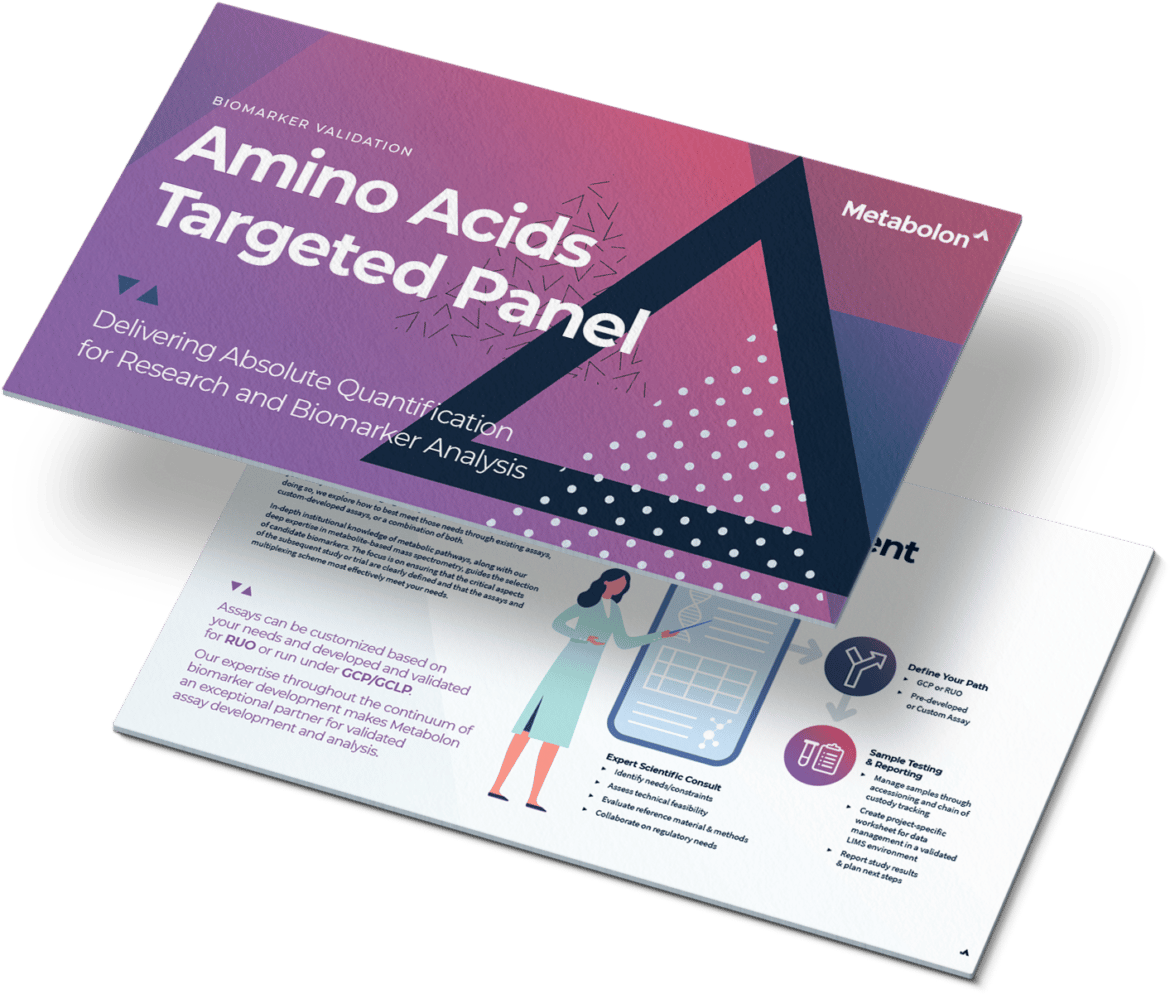
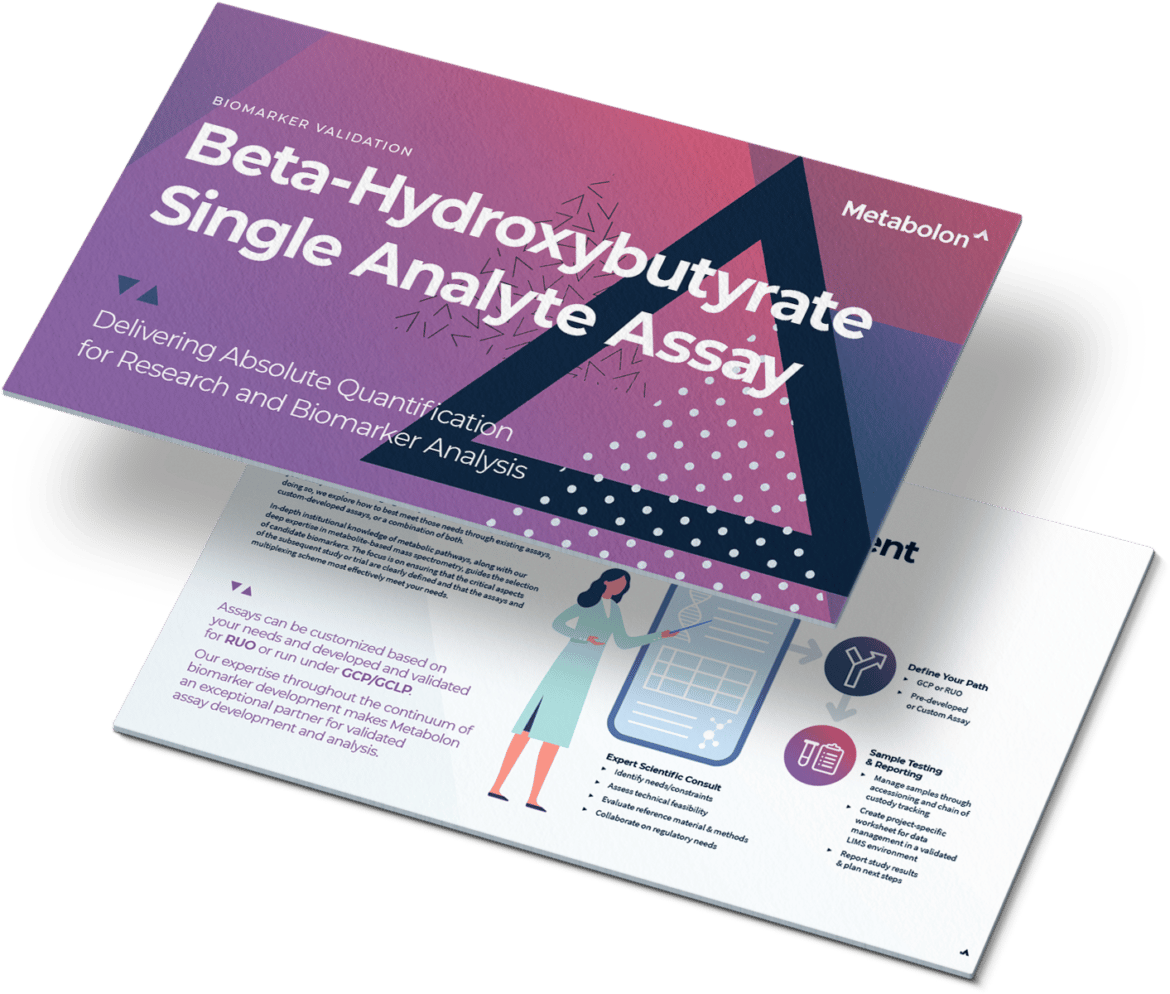
Beta-Hydroxybutyrate Single Analyte Assay
β-Hydroxybutyrate (BHB, 3-hydroxybutyrate) is an endogenous ketone body that accumulates during periods of fasting, calorie restriction and prolonged exercise. It is created via a multi-step process involving the break-down of fatty acids into acetyl CoA, conversion to acetoacetate and reduction to β-hydroxybutyrate in the liver. BHB is the primary ketone found in the blood and is necessary for brain function especially when glucose is unavailable. It also provides neuroprotective benefits, such as relieving oxidative stress and inhibition of apoptotic pathway in cells.
Bile Acids Targeted Panel
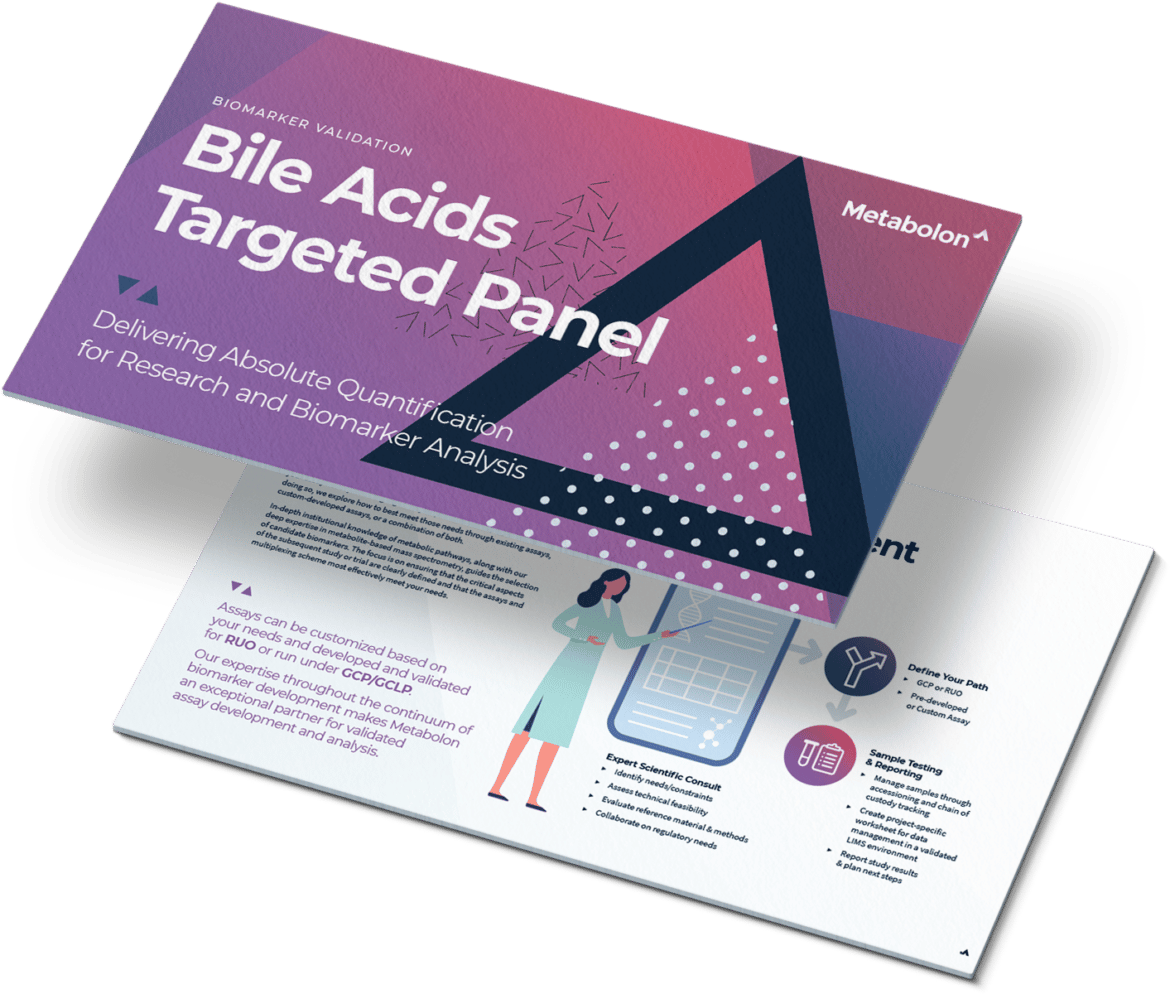
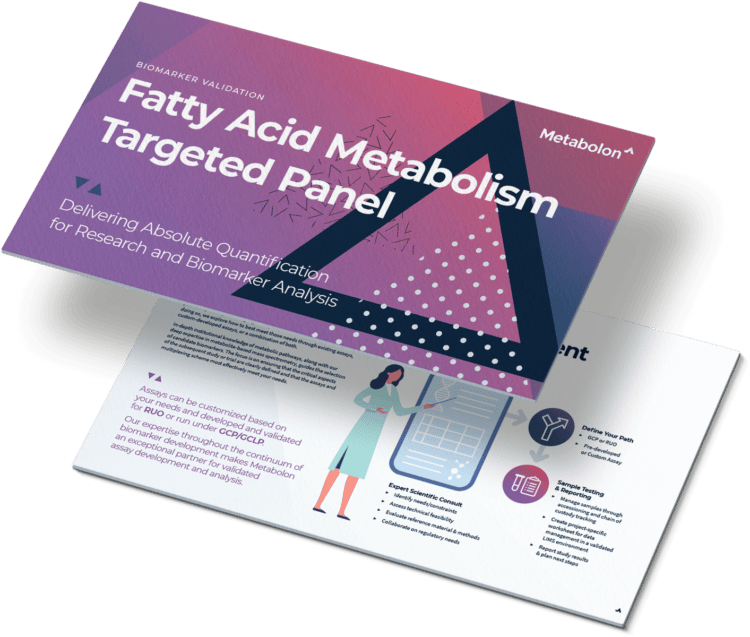
Fatty Acid Metabolism Targeted Panel
Salivary Glucose Single Analyte Assay
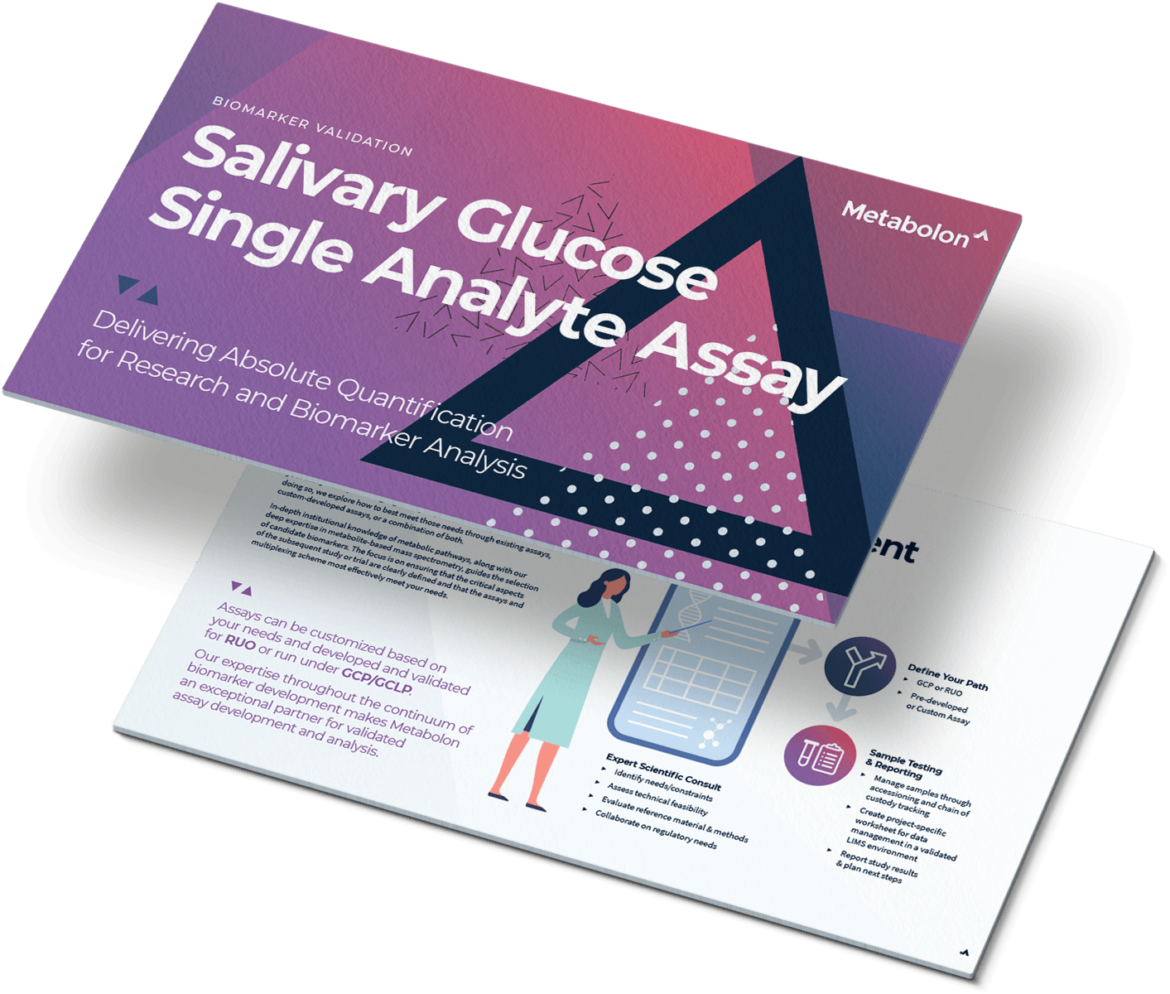

Indoles/Uremic Toxicity Targeted Panel
Short Chain Fatty Acid Targeted Panel
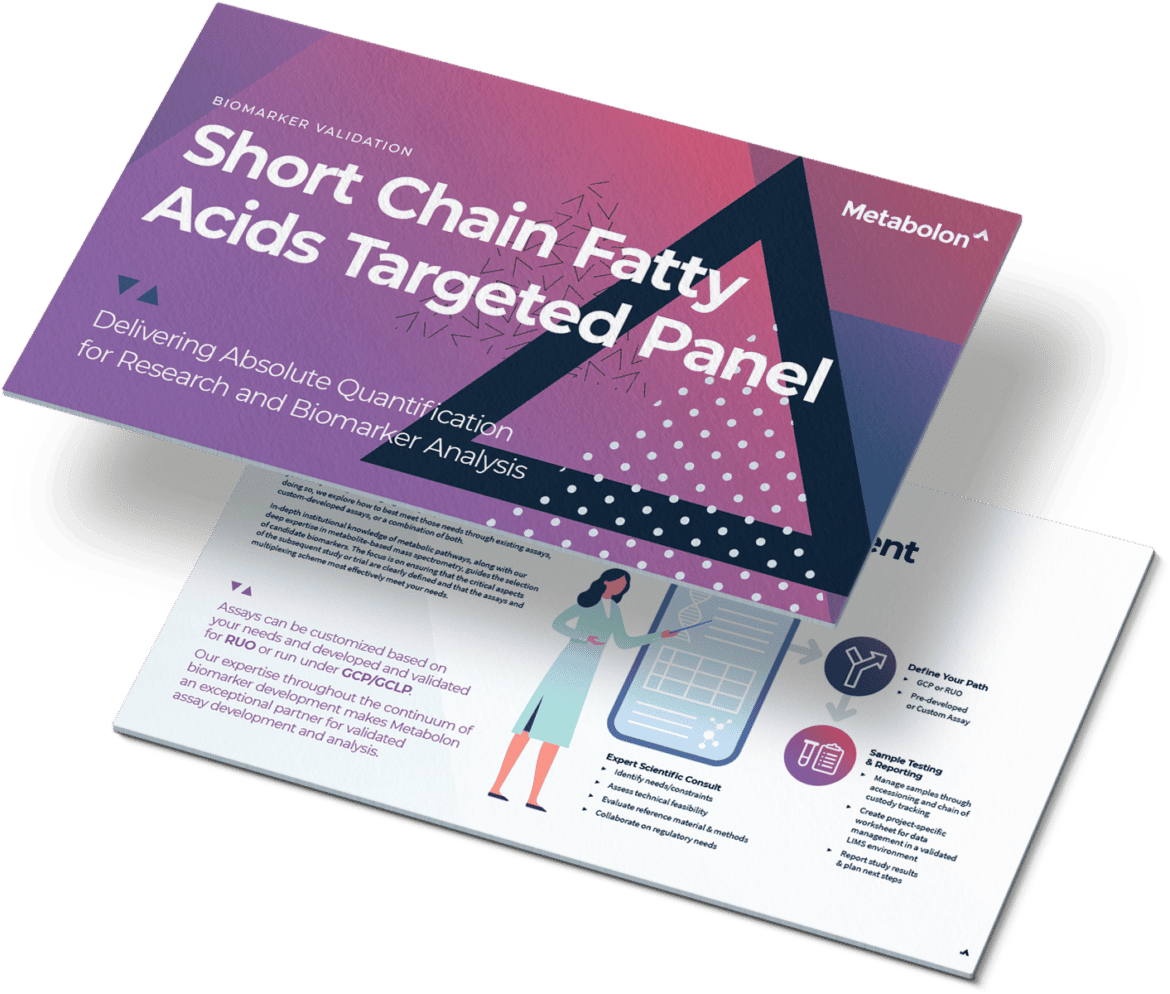
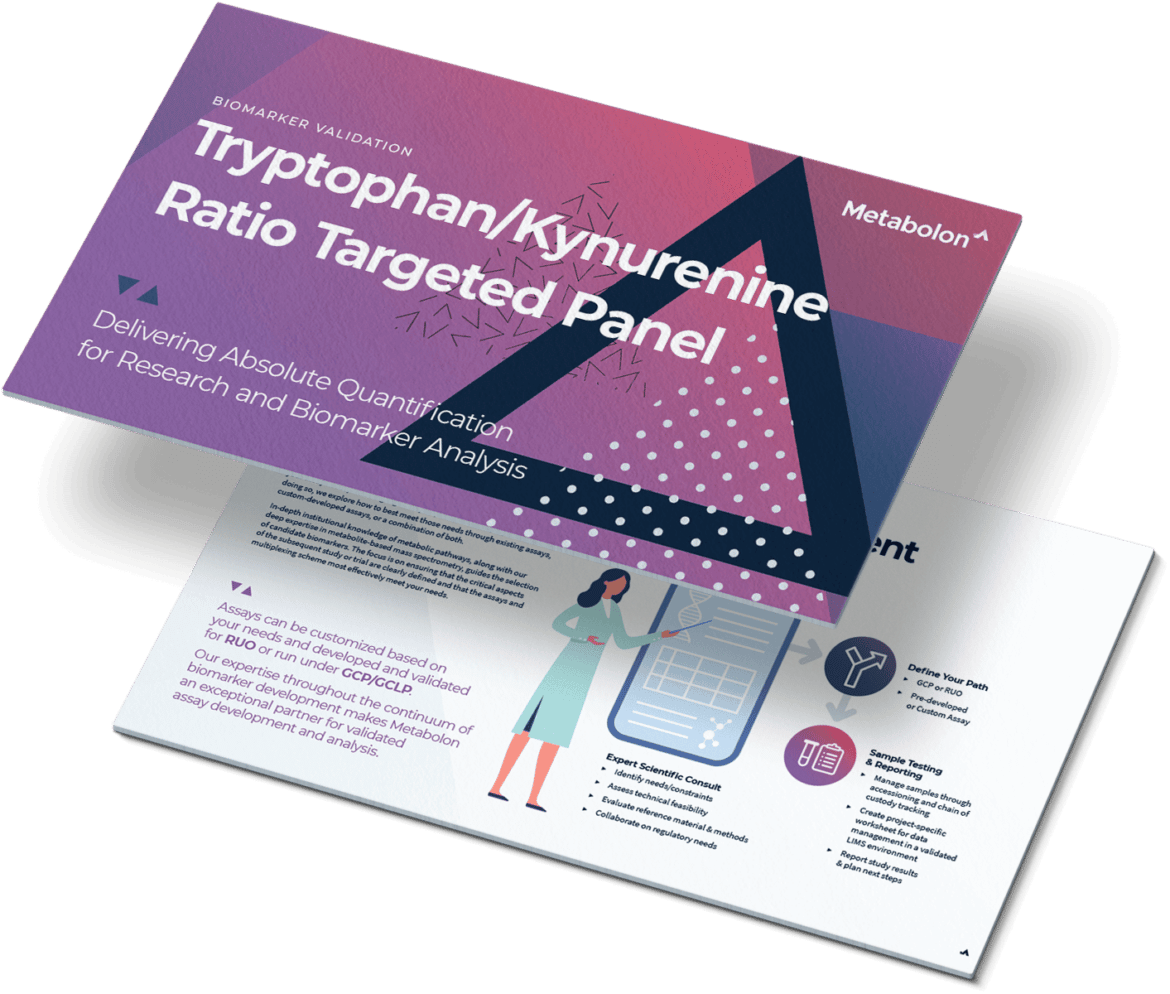
Tryptophan/Kynurenine Ratio Targeted Panel
The kynurenine/tryptophan ratio has been used to reflect the activity of the tryptophan-degrading enzyme indoleamine 2,3-dioxygenase (IDO) in cellular inflammatory response related to symptoms of depression, schizophrenia, and other neurological disease.
Metabolon in Action
Ketogenic Efficacy Through Microbiome Metabolism
A potential treatment for epilepsy without using probiotics is revealed through metabolomics following a ketogenic diet treatment. Metabolon identified hundreds of metabolites, with a large portion of those with significantly altered levels belonging to a class of metabolites called gamma-glutamyl amino acids (GG-AAs). The GG-AAs were found to be reduced in the mice fed a ketogenic diet, suggesting that GG-AA levels were significantly correlated to the number of seizures in the mouse model.
Biomarkers for Neurogenetic Disease Progression
Evaluating the Effect of a Novel Alzheimer’s Disease (AD) Drug
The Metabolon Global Discovery Panel was utilized to establish a CAD-31 metabolomic signature that includes novel biomarkers for treating Alzheimer’s disease (AD). The data from this study demonstrate that in a mouse model of AD, CAD-31 has therapeutic efficacy on the cognitive and physiological parameters of AD. The changes identified in the metabolite profile of CAD-31-treated mice are necessary to determine the physiological consequences of CAD-31 exposure and find markers for target engagement.
Biomarkers of Glucose Transporter Type 1 Deficiency Syndrome (GLUT1-DS)
This study advanced the understanding of metabolic perturbations in the cerebral spinal fluid (CSF), plasma, and urine samples of GLUT1-DS patients and GLUT1-DS patients on a ketogenic diet. The data showed that metabolomics may offer new insights into the molecular mechanisms regulating GLUT1 function and may open new avenues of treatment for GLUT1-DS.
Interested in Further Studies?
Why Metabolon?
Once you see the full value of metabolomics, the only remaining question is who does it best? While many laboratories have metabolite profiling or analytical chemistry capabilities, comprehensive metabolomics technologies are extremely rare. Accurate, unbiased metabolite identification across the entire metabolome introduces signal-to-noise challenges that very few labs are equipped to handle. Also, translating massive quantities of data into actionable information is slow, if not impossible, for most because proper interpretation takes two things that are in short supply: experience and a comprehensive database.
Only Metabolon has all four core metabolomics capabilities
Coverage
Ability to interrogate thousands of metabolites across diverse biochemical space, revealing new insights and opportunities
Comparability
Ability to integrate the data from different studies into the same dataset, in different geographies, among different patients over time
Competency
Ability to inform on proper study design, generate high‐quality data, derive biological insights, and make actionable recommendations
Capacity
Ability to process hundreds of thousands of samples quickly and cost‐efficiently to service rapidly growing demand
Partner with Metabolon to access:
A library of 5,400+ known metabolites, 2,000 in human plasma, all referenced in the context of biochemical pathways
- That’s 5x the metabolites of the closest competitor
Unparalleled depth and breadth of experience analyzing and interpreting metabolomic data to find meaningful results
- 10,000+ projects with hundreds of clients
- 2,000+ publications covering 500 diseases, including numerous peer-reviewed journals such as Cell, Nature and Science
- Nearly 40 PhDs in data science, molecular biology, and biochemistry
Using our robust platform and visualization tools, our experts are uniquely able to tell you more about your molecule and develop assay panels to help you zero in on the results you need.
Related Neuroscience Metabolomics Resources
Contact Us
Talk with an expert
Request a quote for our services, get more information on sample types and handling procedures, request a letter of support, or submit a question about how metabolomics can advance your research.
Corporate Headquarters
617 Davis Drive, Suite 100
Morrisville, NC 27560
Mailing Address:
P.O. Box 110407
Research Triangle Park, NC 27709
References
1. International Foundation for Functional Gastrointestinal Disorders. Facts about IBS. Available at http://www.aboutibs.org/what-is-ibs/facts-about-ibs-2.html. Accessed 08-02-2022.
2. National Institute of Health. Digestive Diseases Statistics for the United States. Available at https://www.niddk.nih.gov/health-information/health-statistics/digestive-diseases. Accessed 08-02-2022.
3. Sung H, Ferlay J, Siegel RL, et al. Global Cancer Statistics 2020: GLOBOCAN Estimates of Incidence and Mortality Worldwide for 36 Cancers in 185 Countries. CA Cancer J Clin. 2021;71(3):209-249. doi:10.3322/caac.21660

